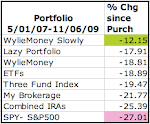- KBE KBW Bank ETF (major banks)
- IAT iShares Dow Jones U.S. Regional Banks Index (regional banks)
- XLF Financial Select Sector SPDR (diversified financial)
- VFH Vanguard Financial ETF (diversified financial)
- IYF iShares Dow Jones US Financial Sector (diversified financial)
Also check out:
- IXG iShares S&P Global Financials (global financial)
- SWFFX Schwab Financial Services (diversified financial- no transaction fee)
- ICFSX ICON Financial (diversified financial- no transaction fee but high turnover)
Another trend that has not gotten as much media coverage (Yet!) but is still in the news on a regular basis is the spike in agriculture prices. Russell Bailyn, whose new book, Navigating the Financial Blogosphere I recently reviewed, wrote a nice overview of the food price situation.
Russell does not mention specific securities in his article so I rounded up a few. Here are some securities that offer various levels of exposure to agriculture commodities:
- DBC PowerShares DB Commodity Index Tracking Fund (Broad Commodities)
- DJP iPath Dow Jones-AIG Commodity Index Total Return ETN (Broad Commodities)
- DBA PowerShares DB Agriculture Fund (Corn, Wheat, Soybeans and Sugar)
- JJA iPath Dow Jones-AIG Agriculture Total Return Sub-Index ETN (Corn, Wheat, Soybeans, Soybean Oil, Coffee, Cotton and Sugar)
- JJG iPath Dow Jones-AIG Grains Total Return Sub-Index ETN (Corn, Wheat, Soybeans)
You can even find securities that track individual commodities, but again Morningstar offers insight into why these might not be smart plays.
I do not own any of these, and am not recommending them. M* (Morningstar) points out that in November, XLF was the second most shorted security on the American Stock Exchange.
Shorting a security is when an investor borrows a security from her brokerage, sells it (let's say at $100 a share) and hopes it loses value. Say it goes down to $75 per share. The investor then buys back the number of shares she originally borrowed and returns them to her brokerage pocketing $25 per share. Of course if the price goes up, she has to by back the shares at the higher price potentially costing her far more than she originally invested, depending on how far the price climbs. You can learn a lot more about shorting stocks by reading An American Hedge Fund by Timothy Sykes.
The point is that a lot of folks are speculating on financial securities and there is no way to know if agricultural commodities will continue to rise, but the securities above will rise or fall along with those sectors. I only know that I don't know enough to get into this game...
"But wait, Wylie... I want to speculate on commodities and throw my money away. What are these ETN things you list?"
First of all... you're crazy.
Second, that's a good question. We'll look into that soon!



No comments:
Post a Comment